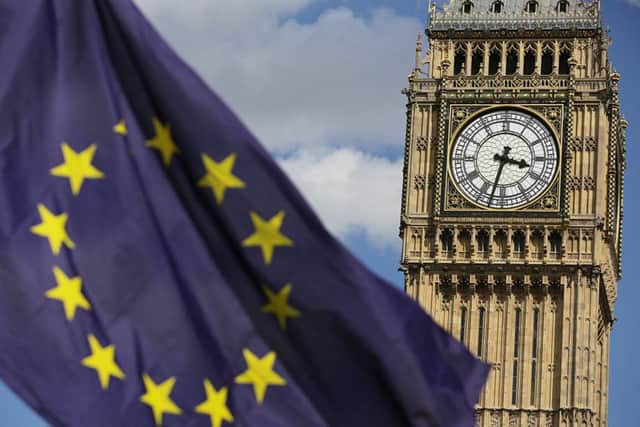Only a second referendum can give clarity over Brexit - Andrew Vine
Yes, there will be howls of protest from the most ardent of Brexiteers, yes Nigel Farage will be as purple with rage as the Ukip banners, and yes, there will be a rolling of eyes from a public weary of the whole sorry mess.
But if an electorate caught between bewilderment and anger at how Britain’s future has become bogged down in seemingly intractable wrangling at Westminster paused and considered, it might realise that a second poll is the only way out.
Advertisement
Hide AdAdvertisement
Hide AdToo much time has passed since the 2016 referendum, and too much has changed in the political landscape for its decision to hold, especially now that the process will possibly be extended by up to a year when Theresa May goes to Brussels tomorrow.


That potentially creates a distance of four years from the referendum – a similar period to that between general elections, when voters often decide that the Government they put in power has not been up to the job, and change their political affiliation to get rid of it.
We have a Government not in control of the process and an Opposition that, more likely than not, will take advantage of talks to find a workable deal to gain electoral advantage over the hapless Prime Minister.
If there is to be a clean break from the tussling that has bogged down Parliament, only a new referendum can provide it.
Advertisement
Hide AdAdvertisement
Hide AdThat is not to disrespect the verdict to leave, but simply to acknowledge that the Britain of almost three years on is a different place, more aware of what Brexit really means and more informed about the options involved.
With that knowledge, if the country voted once more to leave, Brexit could go ahead with a legitimacy that the process is now lacking, thanks to a Government being pulled apart by the divisions within the Conservative Party.
A new vote would need to be much more nuanced than the simplistic in or out of last time. It would have to offer a choice between leaving on specific terms or remaining in the EU, and spell out exactly what each would entail.
Fairness also demands that a new generation of voters who have reached 18 or older since 2016 should be able to have its say over a future that they will ultimately have to deal with. Unless they have that chance, there is a risk of a loss of confidence in our democratic process.
Advertisement
Hide AdAdvertisement
Hide AdTo deny the country the chance to confirm its desire to leave the EU, or to change its mind, would be especially wrong when the politicians charged with implementing Brexit have done so again and again.
From the Prime Minister, changing her stance from “no deal is better than a bad deal” to coming up with a bad deal as the best option, to the lack of consistency in Labour policy, to the flip-flopping of those who shouted loudest for Brexit, they have all shifted their positions.
The highest-profile members of the hardline European Research Group –Jacob Rees-Mogg and Boris Johnson – moved from denunciation of Mrs May’s deal to backing it as a matter of political expediency.
They are perfectly entitled to change their minds, and so is the electorate. Voters should also be entitled, if they choose, to send a clear message that they want Brexit on specific terms.
Advertisement
Hide AdAdvertisement
Hide AdThis has become particularly relevant since both major parties have moved closer to a possible arrangement with the EU that effectively means Britain accepts its rules without having a say in making them.
To many, that might well seem a worse position that staying in, especially if leaving causes an economic shock, because Britain never believed it was voting to become worse off.
The warnings from business that exiting the EU may have catastrophic economic consequences cannot be discounted, certainly not by the platitudes of politicians who put dogma – and even personal ambition – above the national interest.
Remember Boris Johnson saying “F*** business” in response to concerns being raised? That was one of the most disgraceful utterances by any senior politician of modern times and one which should disqualify him from the leadership of the Tories which he craves.
Advertisement
Hide AdAdvertisement
Hide AdAnother, Mark Francois, descended to making absurd references to the Second World War to dismiss a warning by the German boss of Airbus that its British operations could be disrupted by Brexit, with consequences for jobs.
Thankfully, most of their Parliamentary colleagues have been much more moderate, yet have still failed to come up with a clear direction of travel that is likely to heal Britain’s divisions rather than deepening them.
So it must now be a matter for Britain to decide at the ballot box. Only voters can break the impasse and determine the future they want.